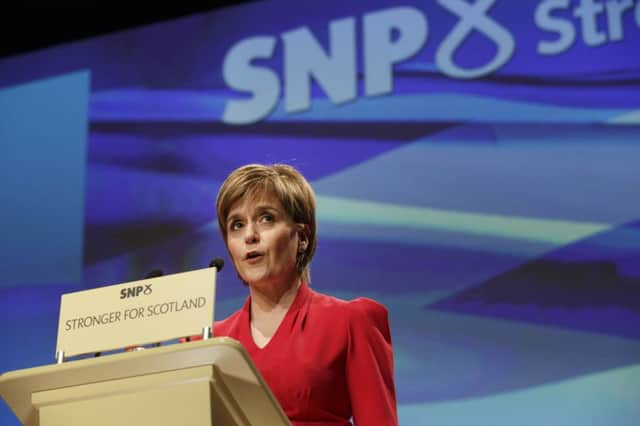Leaders: Can Nicola Sturgeon deliver on promises?


What’s not to like about a programme that, on the whole, promises everything that Labour is offering, plus a little bit more, and no “austerity” cuts to boot? Public spending would go up, including an extra £9.5 billion a year for the NHS, rather than the £2.5bn promised by Labour, the minimum wage would rise to £8.70 instead of Labour’s promised £8, and there would be new homes too, although on this they have been, unusually, outbid by Ed Miliband.
This is the progressive politics consistently promised by the First Minister, to such popular acclaim, in action. It is only likely to buoy up the party’s position in the polls as it remains on course for a remarkable landslide in May’s election.
Advertisement
Hide AdAdvertisement
Hide AdAll this of course will have to be paid for and that is where the attacks of the other parties are sure to concentrate. Axing Trident would of course help to balance the books, but is relatively small beer in sums of this scale. What the Nationalists are relying on is strong economic growth over the coming years, stronger than that predicted by most economists, fuelled by their commitment to increase public spending rather than cut it.
Would this approach work? There are many economic experts who will say there is no reason why not. Would it produce growth of the level being relied upon by the SNP to fund their spending promises? Only time, and a very particular set of political circumstances, could provide that answer.
This is, however, uncomfortable territory for the SNP which, despite its domination at Holyrood, is not yet a natural party of power.
That is an inevitable result of the continuation of the Barnett Formula, which effectively gives pocket money to Scotland, ensuring the country neither gains the benefits nor suffers the pain of its own economic decisions.
It is of course much easier to promise the earth in opposition than it is to deliver once you are in a position of genuine influence. Just ask Nick Clegg and the Liberal Democrats.
The SNP has proved itself a competent administration with a charismatic leader, capable of commanding support, not just across Scotland but also elsewhere in the UK.
The day when it has to prove its economic credentials will come sooner if its demand for full fiscal automony is ever met. Until then it will simply have to ask the electorate to trust it on the economy. The last time that it did that, in the independence referendum, many voters pulled back, fearful of the potential consequences.
This time, however, any such doubts may not prove so damaging at the ballot box, if voters judge that its economic plans will be tempered by whichever party wields the real power after 7 May.
A sporting gesture
Advertisement
Hide AdAdvertisement
Hide AdWHEN it comes to fair play, those often hardy souls who attend big sporting events, rather than settling for watching on television, have plenty to grumble about.
The £3.50 for a bottle of water and £10.50 for a fish supper charged at golf’s last Open Championship are a prime example of the exorbitant prices which leave spectators feeling, at best, taken advantage of and, at worst, fleeced. The drop in attendance the last time the Open was held at Muirfield, however, has clearly provided food for thought.
Of course the Open Championship is a crucial source of income for the Royal and Ancient and supports its work promoting the game to a new generation. The same is true of Wimbledon and the Lawn Tennis Association which are the subject of similar gripes. It is not reasonable to expect the sporting authorities to slash prices across the board for their blue riband events.
It is important though that they leave spectators feeling as though they have had reasonable value for money. Otherwise they will vote with their feet and stop attending.
Cutting the cost of a bottle of water to £1.50, for example, as the R&A is doing, has to be welcomed. When you consider that most visitors will spend eight or nine hours walking the length and breadth of the course to see the action, it is not really reasonable to expect them to cart their own sandwiches and drinks with them. This feels a lot more like fair play and is probably a canny move into the bargain.
Visitors won’t feel as though they have been ripped off, but at the same time it is unlikely to hit the R&A in the pocket in the same way as cutting the £70 daily entrance fee.